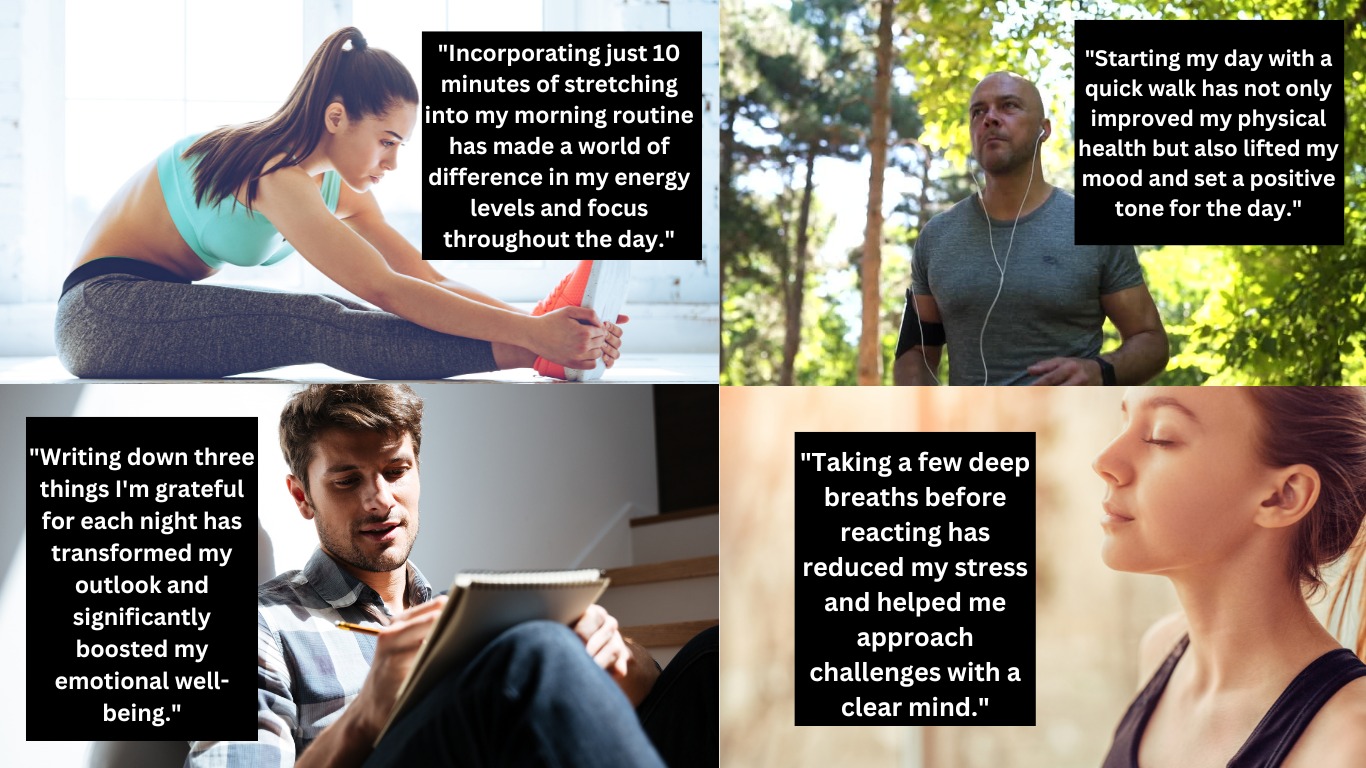Disclosure:
Thank you for reading this post, don't forget to subscribe!
Some of the links on this website are affiliate links. This means that if you click on the link and make a purchase, we may receive a small commission at no extra cost to you. Your support helps us keep the site running.Learn more on my Privacy Policy and Affiliate Disclosure page. Thank you for your support!
Micro-habits might sound like a buzzword, but they hold some serious clout when it comes to wellness. So, what’s the deal with micro-habits? In short, micro-habits are small, manageable actions you can incorporate into your daily routine effortlessly. Think of them as tiny tweaks that compound over time, creating a big impact without causing overwhelm.
Unlike traditional habits, which often seem like monumental tasks that require a ton of willpower and effort, micro-habits fly under the radar. They slip into your day almost unnoticed, making consistency way easier. For example, instead of committing to a 30-minute workout right off the bat, you might start with just five minutes of stretching. Tiny? Yes. Effective? Absolutely.
Why should you care? Because these micro-habits can be life-changing. They minimize friction and resistance, making it simpler to stick with them. This is particularly important for wellness since the journey to better health is more of a marathon than a sprint. With micro-habits, you’re laying down bricks for the long haul without feeling crushed by the weight of huge goals.
The upside here is massive. Want better physical health? Drink an extra glass of water each day. Aiming for a clearer mind? Spend two minutes on mindful breathing. These teeny practices add up, inching you closer to your wellness goals without the burnout. And hey, who doesn’t want to reach their goals with as little stress as possible?
It’s not just about looking at the big picture; it’s about appreciating the small strokes that paint it. So as we move forward, keep in mind that the journey to wellness is built on these small, intentional actions. Micro-habits might just be the game-changer you didn’t know you needed.
read next: Glowing Skin From the Inside Out: Discovering the Gut-Skin Link (Highlighting the impact of small habits on skin health)
The Science Behind Micro-Habits
Talking science might sound heavy, but bear with me. When it comes to micro-habits, there’s solid scientific backing showing just how effective these small changes can be.
Starting with the brain – our brains love consistency. They’re wired to respond well to routines and patterns. Smaller tasks or habits are way less intimidating for our brain. This means we’re more likely to stick to micro-habits because they don’t set off any alarms in our heads. There’s no ‘uh-oh, this is too much work’ reaction.
Ever heard of dopamine? That’s the feel-good chemical your brain releases when you achieve something. Micro-habits play into this perfectly. Completing small tasks gives a quick dopamine hit, making you feel accomplished. Over time, these little hits add up, and your brain starts associating the habit with positive vibes. This keeps you motivated to continue.
find out more about: The Neuroscience of Habits-How They Form and How to Change Them (scientific america).
Research backs this up. Studies show that starting with small changes helps build momentum. A study published in the European Journal of Social Psychology found it takes about 66 days on average to form a new habit. Micro-habits make it easier to reach that point because they’re not overwhelming.
Behavioral experts also emphasize the ‘cue-routine-reward’ loop. Micro-habits can easily fit into this loop. The cue triggers the habit, the routine is the habit itself, and the reward is the satisfaction from completing the task. Over time, this loop strengthens, solidifying the habit.
So, next time you think you need a big overhaul for big results, remember that science says otherwise. Super small steps can lead to significant changes. Micro-habits sync perfectly with how your brain and behavior work, making them a powerhouse in your wellness toolkit.
Physical Wellness Through Micro-Habits

Physical wellness often feels like a mountain to climb, but micro-habits can make it more like a series of small, manageable hills. Incorporating simple actions into your daily routine can lead to noticeable changes without feeling burdened.
Let’s talk actionable micro-habits for physical health. Start with something as basic as daily stretching. A quick five-minute stretch in the morning can set you up for a day of better posture and less stiffness. Another easy win is drinking an extra glass of water daily. Hydration is key for pretty much everything your body does, and this small step can improve skin health, energy levels, and digestion.
Making these habits fit into a busy schedule might seem tricky, but here’s a tip: pair new micro-habits with existing routines. For example, stretch while waiting for your morning coffee to brew or drink a glass of water every time you check emails. This way, you don’t have to carve out extra time; you’re just adding a beneficial twist to what you’re already doing.
learn more about: Locking in Brain-Healthy Habits-Key strategies for making positive lifestyle changes.
Consistency is the magic ingredient. The beauty of micro-habits is that their small size means you’re more likely to stick with them. And here’s the kicker: those small, consistent actions lead to long-term benefits. Think improved flexibility, better hydration levels, and even more energy throughout the day. It’s like an investment where you’re adding a little bit each day, but over time, the returns are substantial.
So, pick one or two physical micro-habits and integrate them into your daily life. The goal isn’t to overhaul your entire routine overnight; it’s to make small, sustainable changes that contribute to your overall wellness. Remember, the journey to physical wellness doesn’t have to be daunting. With micro-habits, it can be a seamless part of your day-to-day life.
Mental and Emotional Wellness with Micro-Habits

Mental and emotional well-being might seem like a high bar, but micro-habits can make a real difference. Small, consistent actions can help reduce stress, build emotional resilience, and improve mental clarity.
Take mindful breathing, for instance. Spending just two minutes focusing on your breath can lower stress levels almost instantly. It’s simple enough to do anywhere, whether you’re at your desk or waiting in line. Journaling is another gem. Jotting down your thoughts for a few minutes every day can help organize your mind, making problems seem more manageable.
Building emotional resilience doesn’t require grand gestures. Simple activities like acknowledging what you’re grateful for each day can shift your mindset from negativity to positivity. Over time, these small adjustments can create a more resilient mental state that’s better equipped to handle life’s ups and downs.
Micro-habits can also sharpen mental clarity and focus. A brief, daily session of meditation can work wonders for clearing mental clutter. Similarly, dedicating a few minutes to plan your day can help align your thoughts and intentions, leading to a more organized mind.
Check out: Micro-habits for life-long learning-pubMed national library of medicine.
The beauty of these micro-habits is that they’re incredibly accessible. You don’t need special equipment, a lot of time, or even a designated space. The key is consistency. Integrating small actions into your daily routine brings cumulative benefits that become more noticeable over time.
Start small, be consistent, and watch how these micro-habits positively impact your mental and emotional well-being. These simple practices might just become your go-to tools for navigating everyday stress and maintaining mental clarity.
Creating Your Own Micro-Habit Plan
Ready to make your own micro-habit plan? Let’s break it down into manageable steps. Start by identifying the areas of your life where you want to see change. Whether it’s physical health, mental well-being, or even productivity, pinpoint specific goals.
Next, think small. The essence of micro-habits is their simplicity. Pick tiny actions that are so easy you can’t say no. This might be as simple as doing one push-up each morning or taking three deep breaths before bed. The key is to make these habits so simple they’re almost laughable.
Now, let’s talk tracking. Keeping tabs on your progress helps maintain motivation and accountability. You can use habit-tracking apps, a notebook, or even a simple checklist. Seeing your progress visually can give you that extra push to keep going.
Staying consistent is vital. Incorporate your micro-habits into your existing routines. For example, if you’re trying to drink more water, tie it to an existing habit like brushing your teeth. This makes it easier to remember and stick to your new habits without feeling overwhelmed.
As you progress, it’s important to adjust and refine your micro-habits. If something isn’t working, tweak it. Maybe a different time of day works better, or a smaller action is more manageable. Flexibility ensures that your micro-habits align with your lifestyle and remain achievable.
Creating a micro-habit plan isn’t about perfection; it’s about making small, consistent efforts that lead to significant change. Start small, track your progress, stay consistent, and be ready to make adjustments as needed. This plan will help you set the foundation for lasting wellness improvements.
Success Stories: Real-Life Examples of Micro-Habits

Seeing micro-habits in action can be super motivating. Real-life stories highlight how these tiny changes make a huge difference.
Take Maria, for example. She struggled with stress and wanted to improve her mental well-being. Maria started small—setting aside just five minutes daily for mindful breathing. Over a few months, she noticed she felt calmer and more focused. This little habit turned into bigger changes, like regular meditation and journaling, all starting from those initial five minutes.
Then there’s Jake, who felt overwhelmed by the idea of exercising. Instead of committing to an hour at the gym, he started with a single push-up each morning. It seemed almost too easy, but it wasn’t long before that one push-up turned into five, then ten, and eventually a full workout routine. Now, Jake feels stronger and more energetic.
Another inspiring story comes from Lisa, who wanted to improve her nutrition. She began by adding one extra serving of vegetables to her meals each day. This simple change led to better food choices overall as she became more mindful about what she was eating. Lisa now enjoys a balanced diet and feels healthier than ever.
These examples prove that micro-habits work. They show that starting small doesn’t mean thinking small. Over time, these tiny habits can snowball into significant, positive changes. Let these stories inspire you to start your own micro-habit journey. Remember, every big change begins with a small step.
Common Challenges and How to Overcome Them
Establishing micro-habits isn’t always smooth sailing. Sometimes life throws curveballs, or motivation dips. Identifying common challenges can help you be better prepared to tackle them head-on.
Read more about: Tiny Habits for Big Brain Health Gains: The Neuroscience of Small Changes.
One major obstacle is lack of time. It’s easy to feel like there’s no room in your day for even the smallest habit. But remember, micro-habits are designed to be quick. Tie them to daily activities you’re already doing. For instance, stretch for a minute while your coffee brews or practice mindful breathing during your commute.
Another biggie is losing motivation. We all have days when we’re just not feeling it. On those days, remind yourself why you started. If that’s not enough, tweak your micro-habit to be even smaller. Doing something is always better than doing nothing.
explore more:
- Gut Health Decoded: How Your Microbiome Shapes Energy, Mood, and Immunity
- The Science of Stillness: How Doing Nothing Can Heal Your Mind and Body
- Are You a Late-Night Snacker? 5 Possible Reasons Why You Can’t Stop Craving Food at Night
- The Ultimate Fat-Loss + Muscle Retention Blueprint (For Men)
- Smart Biceps Training: A Science-Backed Blueprint for Bigger, Stronger Arms
Consistency can also be tricky. Life gets busy, and new habits can slip through the cracks. Using habit trackers or setting reminders on your phone can help keep the habit front and center. Plus, visually tracking your progress can be super motivating.
Another challenge is dealing with setbacks. Maybe you miss a day, or even a week. It’s important not to beat yourself up. Simply acknowledge it and start fresh the next day. The key to success is persistence, not perfection.
Finally, don’t be afraid to refine your micro-habits. If something isn’t working for you, tweak it. Maybe it’s the timing or the activity itself. Flexibility ensures that your micro-habits fit seamlessly into your life, making them easier to stick with.
Embracing these strategies can help you overcome the challenges you’ll face on your micro-habit journey. Remember, every step, no matter how small, brings you closer to your wellness goals.
for you: 10 ESSENTIAL WELLNESS HABITS FOR A HEALTHIER, HAPPIER LIFE
The Long-Term Impact of Micro-Habits on Wellness
Over time, the small changes from micro-habits can lead to lasting improvements in wellness. Imagine each micro-habit as a single drop adding to a bucket. Eventually, the bucket fills up, and the impact becomes undeniable.
Consider the cumulative effect of these daily actions. Drinking an extra glass of water might seem insignificant day-to-day, but over months, it can lead to better hydration, improved skin, and additional energy. Similarly, a few minutes of daily stretching can result in greater flexibility, reduced muscle tension, and fewer aches and pains.
Micro-habits don’t just stop at physical benefits. Emotional and mental well-being also see long-term gains. Regular mindful breathing can lower stress levels consistently, creating a calmer mental state. Journaling can enhance self-awareness and emotional resilience, keeping you grounded and balanced.
One of the biggest advantages of micro-habits is their sustainable nature. Because they’re so easy to integrate into daily life, they’re more likely to stick. Over time, they become second nature—a part of your routine that doesn’t require extra effort or thought.
The real magic of micro-habits is in their quiet, persistent power. They’re like tiny seeds that grow into strong, healthy trees over time. These small actions, repeated consistently, turn into a lifestyle of wellness without you even realizing it’s happening.
So, as you consider your own wellness journey, remember the power of micro-habits. Embrace these small changes, and over time, watch them transform your life in profound and lasting ways.
additional resource Habit-Tracking Apps and Tools: Explore popular apps like Habitica, Streaks, or HabitBull to help you track and maintain your micro-habits consistently.
Recommended Reading on Habits and Wellness: Books like “Atomic Habits” by James Clear and “The Power of Habit” by Charles Duhigg offer deep insights into building and sustaining habits for long-term wellness.
Online Communities for Support and Accountability: Join communities like the r/habits subreddit or wellness-focused groups on platforms like Facebook or Reddit to connect with others on a similar journey and stay motivated.
more about:
health / fitness / wellness / nutrition









A lifestyle centered on wellness leads to lasting happiness. AffordABle Womens Short Water Valley, AB
Thank you for your insightful comment! I completely agree that a lifestyle centered on wellness can lead to lasting happiness. It’s wonderful to see others who share this belief. Let’s continue to promote and embrace wellness in all aspects of our lives.